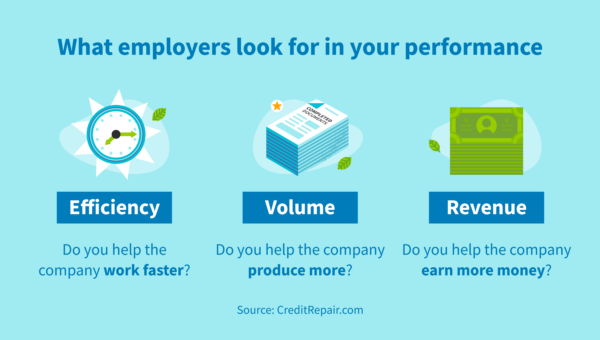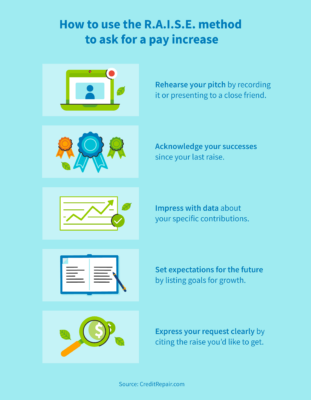
Disclosure regarding our editorial content standards.
If you’re thinking about asking for a raise, you’ve probably got a few questions bouncing around your head: How much do I ask for? When should I ask? What should I say?
A lot of people deserve a raise, but few people actually ask for one. Data from PayScale reveals that only around 43 percent of American workers have ever requested a raise. That said, higher-income workers are more likely to ask for a raise than lower-income workers.
Regardless of your situation, you shouldn’t be afraid to ask for compensation that matches your performance.
If you’re searching for a step-by-step guide on how to ask for a raise at work, look no further. Follow these six simple steps, and you’ll be on your way: evaluate yourself, collect feedback from others, think about your growth opportunities, find the right moment, do your research and present your pitch confidently.
1. Evaluate your performance
Before asking for a raise, you’ll need to take a look at your performance since your last pay increase or since you started at your current job. The basis of your pay increase is the value you add to your employer, so taking the time to measure your contributions to the company is a crucial first step.

Even if your employer isn’t paying close attention to data, you should be. Almost every job can be broken down into hard numbers, or quantitative data, and knowing how you’re doing is the only way to set measurable goals for your growth.
Since you’re asking for a raise, you’ll want to consider what is important to your manager. After all, your manager has their performance evaluated as well—try to frame success in terms that your boss’s boss will care about.
Consider some of the following types of data to analyze your own performance:
- Efficiency: Have you or your team been able to complete tasks more efficiently due to your efforts? That saves the company time and creates value.
- Volume: Have you added more clients? Are you handling more business? Is your team of direct reports growing? Has your project expanded? Any of these changes could be signs that your performance is directly helping the company.
- Revenue: Can you directly tie your efforts to a growth in sales or revenue? Has a deliverable you contributed to been successful? Are your customers renewing contracts or reordering products?
Your job may have different kinds of data, but whatever you track should have the same end goal: demonstrate that your work adds value to the company. If you’ve contributed to your company’s growth, they’ll want to keep you around—even if it means giving you a raise.
Hector Gutierrez, CEO of JOI, echoes this sentiment: “Bring evidence to advocate for yourself. Oftentimes, managers and CEOs simply do not see everything that happens in their business. You want to show that you’re taking initiative to not only manage a myriad of projects, but that you’re responsible enough to keep track of all of your accomplishments.”
2. Collect feedback from others
In addition to quantitative data, you’ll also want to collect feedback from those you work with. Your manager’s opinion of you is shaped by not only their own perception but also the formal and informal feedback that you receive nearly every day.
Try to collect the following information:
- Formal performance review records: Data suggesting positive performance from one quarter to the next demonstrates consistency and growth.
- Coworker feedback: Work is increasingly collaborative, so informal feedback from others provides evidence of successful teamwork.
- Client and customer comments: When the clients and customers you directly or indirectly support are satisfied, their comments will point to the strength of your performance.
Your own perspective is important in shaping the conversation around your raise, but strong comments from other members of your team and customer base are very helpful in strengthening your case.
3. Think about your growth opportunities
You’ll want to think about ways to grow within your current role and the company in general. While your past performance is helpful in justifying a raise, your employer will also want to feel confident that your increased salary will be met with improvements on your part.
Find ways to frame your career goals in ways that will benefit the company:
- State your goals: What do you plan to change or achieve in the next few months or quarters? How will these changes benefit the company?
- Redefine your role: How will your role grow to meet the future needs of your employer? What new responsibilities will you take on?
- Explore the long term: What long-term difference can you make in the growth of your company? How will you contribute to key changes?
If you can show that you’ve benefited the company and you have plans to continue to build on that success, you’re in a great position to ask for a raise. On the other hand, if you don’t really see yourself as part of the future of your current employer, you could consider taking your skills and experience to a different job instead, since that also carries the possibility of a pay raise.
4. Find the right moment
Although there will never be a perfect time to ask for a raise, there are definitely moments that are better or worse.

No matter what, make sure you set a meeting for your request—a spontaneous conversation is almost never the right approach when asking for a raise. During an unplanned conversation, you likely won’t have the opportunity to present your evidence fully, and your boss may be blindsided. Instead of bringing up your request in an unrelated meeting, set up a meeting specifically for this discussion.
Here are a few things to keep in mind when you’re finding the right moment to ask for a raise:
- It’s generally best to wait six months to a year or more after your last raise to ask for another one. That said, if your roles or responsibilities change significantly before that time frame, it may be fine to ask sooner.
- If you already have an upcoming performance review on your calendar, there’s no need to set another meeting. Instead, speak with your manager and ask that a discussion about your compensation is included as part of the meeting.
- You’ll want to be sure to avoid asking for a raise during periods of financial downturn, layoffs or hiring freezes. Even if you feel you deserve a raise, asking for one at a tough time could send the wrong message to your employer.
Make sure that you plan to discuss your raise in a private setting. Avoid common areas or meetings that involve other people who aren’t involved in determining your compensation.
In any case, you’ll want to have a face-to-face meeting when asking for a raise. As tempting as it may be to present your evidence through email, you’ll likely have better success by taking the time for an actual meeting, even if it feels overwhelming. Having the courage to confidently present your strengths as an employee will serve you in both getting fair compensation and performing your day-to-day role.
5. Do your research
Once you’ve gathered evidence justifying your raise and have set a meeting up, there’s still an important question: how much should you ask for? Setting a monetary value for your efforts can be difficult, especially if you factor in negotiations that may follow. But you do need to come to your meeting prepared with a number in mind, since your employer is not likely going to present a new salary to you without hearing a specific proposal.
When thinking about a specific dollar amount, you’ll need to watch out for the two pitfalls of a raise. If you ask for too much, your boss could perceive you as selfish or arrogant. On the other hand, if you don’t ask for enough, your employer may be more than happy to continue underpaying you.
So how do you figure out how much to ask for? Try using some of the following strategies:
- Look at online tools: While online tools are imperfect, they can help give you a benchmark for how much others in your position and field are making. Rough figures can give you a sense of how well your current compensation compares with those of others who have similar roles.
- Explore your company’s pay ranges: Many companies provide pay ranges for specific positions. If you’ve been significantly successful and have compensation on the lower end of your position’s range, you have a good target to shoot for.
- Ask others about compensation: Depending on your relationships with your coworkers, you could ask them their compensation in order to get a point of reference for your own. But if you’re not comfortable doing that, you can also try to get information indirectly. Ask other people you know in your field the following question: “How much do you think a [your current role] would make at your company?” A trend may emerge and give you clues about what kind of raise to ask for.
- Consider the cost of living: Although you should never give the cost of living as a reason why you deserve a raise, you can use the cost of living to determine an appropriate pay rate. Comparing compensation between high- and low-cost areas can give you a skewed impression, so consider your area specifically when asking for a raise.
Conventional wisdom says that asking for up to ten percent of your current compensation is a good benchmark for a raise, but this rule isn’t ironclad. Depending on your recent growth and your starting pay rate, it may be necessary to ask for more than ten percent in some cases.
As startup founder Lisa Odenweller says, “The biggest thing is to be willing to ask for what you want. If you know your worth, learn how to advocate and negotiate for what you deserve. We want to have a core team that’s in it for the long haul.”
After you’ve done your research, go into your meeting with confidence in the amount you’re requesting. You may not get you the exact figure you want, but not asking at all is a surefire way to keep your current pay.
6. Present your pitch with the R.A.I.S.E. method
You’ve got data about your performance, a meeting with your manager and a desired raise in mind. Now there’s just one question left: what should you say? Since this is an important meeting, you don’t want to leave your presentation up to chance. Instead, take some time to work on your proposal and make sure you don’t leave any details out.

One of the best ways to prepare for success as you ask for higher compensation is to use the R.A.I.S.E. method: rehearse your presentation, acknowledge your successes, impress with data, set expectations for the future and express your request clearly.
Let’s look at each of these aspects in detail:
- Rehearse your pitch: To feel confident going into your meeting, you’ll need to practice. Try recording yourself or giving your presentation to a close friend or family member. Being familiar with your talking points and practicing presenting a clear and cohesive message will increase your chances of success.
- Acknowledge your successes: Too often when asking for a raise, we veer away from the core message. Take a moment in the first part of your pitch to specifically cite details about what you’ve done well since your last pay increase.
- Impress with data: Make sure to steer the conversation toward numbers, preferably with a presentation or folder with data for your manager to review. Emphasize your role in producing growth, again making sure to use specific accomplishments that had a direct effect on your company.
- Set expectations for the future: End your presentation with an eye toward future growth, listing your goals and ambitions for continuing to support the company’s long-term success as well as your own.
- Express your request clearly: After taking that opportunity to summarize your accomplishments, make sure that you present the specific figure you’re requesting, restating that you feel the value you bring to the company justifies the pay increase.
By using the R.A.I.S.E. method, you’ll put yourself in a great position to make your case for a pay increase. Although many people are hesitant to rehearse their presentation, this is one of the most crucial steps of all.
According to Logan Mallory, VP at Motivosity, “The more you practice, the more confident you’ll feel having the conversation with your manager.”
As your meeting ends, make sure to take a moment to thank your manager for their support and for taking the time to meet with you. In most cases, your manager won’t immediately respond to your request—they likely need to consult with other leadership before authorizing a raise.
If you receive your raise: congratulations! Asking for a raise is one of the most difficult things an employee can do, so you should be proud of yourself.
If your raise is denied, know that you likely haven’t done anything wrong. Pay increases can be denied for many reasons that are outside of your control and have nothing to do with your performance.
You should, however, take a moment to politely ask your manager what’s holding you back from increased compensation. Frame that conversation around goals and growth rather than hurt feelings and disappointment. Let your manager know that you’re committed to the company and ask for specific measures of success that would make you a strong candidate for a raise in the future.
No matter what, keep crushing it. Even the fact that you’re looking for a raise is a sign of ambition that points to your future success. Look for ways to continue to learn and grow in your current role, or make the jump to a new opportunity. When the time comes to try for another raise, don’t forget to evaluate your performance, find the right moment, do your research and craft a great pitch. CreditRepair.com is rooting for you.

Reviewed by Leikeisha Finai-Jones, Credit Consultant at CreditRepair.com.
Leikeisha Finai-Jones joined CreditRepair.com back in 2020 as a social community coordinator. Leikeisha knows how the credit industry works and how what pitfalls consumers need to look out for—Leikeisha mastered the skill of problem-solving even in tough situations involving identity theft, credit repair and other issues. Leikeisha has seen it all, and knows how consumers can make the most of their rights to boost and protect their credit.
Note: The information provided on CreditRepair.com does not, and is not intended to, act as legal, financial or credit advice; instead, it is for general informational purposes only.






